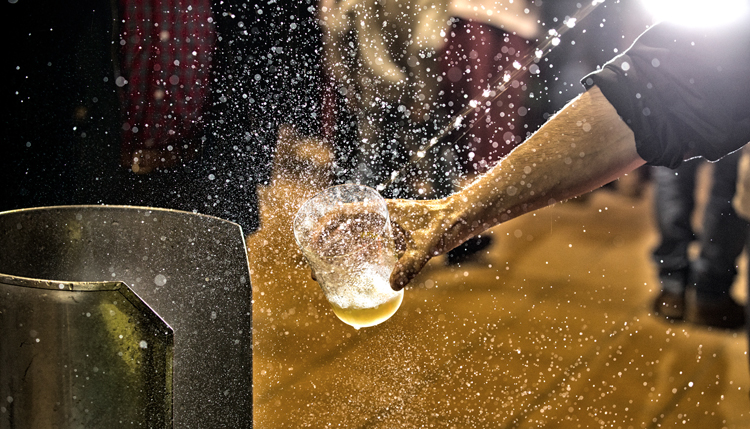The fame of the cider of Asturias is well deserved. Not in vain; it has accompanied this region’s journey for centuries. Everything, from the ointments to the llagares (grape press), is nature and tradition. The quality that it treasures is maintained up to the highest standards.

To say that the Cider of Asturias is merely a beverage, even if we recognize it as a delicacy, would be at best an injustice if not a vulgarity. More than that, it is a local totem whose history begins with the legendary Asturians, at a time when the apple trees already dominated this territory.
The Romans, so fond of wine, surrendered to what they called zytho. They must have really liked that original cider because terms such as pomar or pumares (apple orchard) come from those ancient times. From then on, cider has been part of the Asturian sentimental landscape thanks to its unparalleled quality.

How can we explain this greatness? Without good apples, it is impossible to make good cider. In Asturias, fortunately, there are 500 varieties to choose from.
Still, the Regulatory Council of the DOP Cider of Asturias exclusively considers 76 as ideal for producing a drink that bears its seal. The coloradona, the xuanina, or the perezosa, to mention a few varieties, make the cider a gastronomic monument, each providing its particular nuances.
The logical consequence of using this raw material becomes evident in every drop. Daniel Ruiz, manager of the DOP Cider of Asturias, explains how this drink “is unique in the world, due to the way it’s created and poured (escanciado). Not to mention the particular social habits around it and the sustainable recycling system.”
Magic at the press
The Asturian calendar is intimately linked to the manufacture of this delicacy. In spring, we witness the breathtaking flowering of the apple orchards. In summer, the fruit begins to take form, and in autumn, after the pañada (harvest), the fruit goes to the llagares or presses, which is where the magic begins.

After fermentation, during the winter, the cider is passed from one barrel to another. The residue is removed from the bottom in a process so delicate it seems alchemic. Here the skill of each “llagar” provides the cider with its unmistakable touch.
Beyond this natural method, as Daniel Ruiz reminds us, the producers are committed to increasing their quality even more “through innovation and research to improve the product and its presentation. Combining tradition and technology is the way of the future. Furthermore, the hundreds of controls carried out by the Regulatory Council are essential to showcase the European quality brand”.
In the glass and on the stove
There are plenty of opportunities to honor the outcome of this laborious process. In addition to the typical establishments such as wineries and cider bars, many espichas, festivities with no cider and food shortage, are celebrated throughout the region. Its low alcoholic content and refreshing point of acid tones make it a magnificent companion in folixas, pilgrimages, and the many festivals during the Asturian summer season.

To consume it properly, cider demands a ritual. Asturias is the only place in the world where cider is poured into the air in a way not suitable for those of unsteady hands. Why? It is not just for show. When cider falls from a considerable height and hits the glass’s rim, it breaks down into foam, assuring its adequate oxygenation. Thus, it is ready to be drunk in one gulp or culín.
In Asturian gastronomy, cider not only harmonizes with its most iconic dishes such as cheese, sausages, or seafood, but it is the main ingredient in many recipes. The avant-garde and the most profoundly rooted cuisine use this exceptional resource to get spectacular results, such as hake in cider or pitu caleya.
At Paradores
Cider, of course, has its place in the offer of Paradores. In Gijon, for example, Paradores offers natural ciders and brut ciders, such as Pomarina and EM Brut Nature. Furthermore, every season there is no shortage of dishes made from natural cider. Such include chorizo in cider, hake, salmon as well as tuna-filled onions.

“There is a lot of pull among the customers,” explains the director of the Parador de Gijon, Pilar Valdés. There is a lot of interest among those who come to witness first-hand the local excellence. And, of course, “they ask why cider is poured that way.” Shortly after, their doubts are clarified, and the cider is enjoyed. Everyone is happy.
Since the product is sacred to Paradores, the standards are very high. “The cider used in our kitchens is natural, and the one offered to customers bears a black label, with the designation of origin and limited edition,” says Valdés. The best, as always, at Paradores.
Varieties of the DO Cider from Asturias

-Natural Cider: the traditional one, which is not filtered and needs to be poured, and the filtered one does not require it.
-Sparkling Natural Cider: it is generally a dry cider, brut type with endogenous carbon gas.






